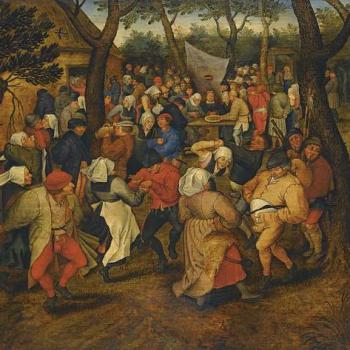I’ve been reading various cultural critiques of the mess we’ve gotten ourselves into, and several put the blame on the Reformation. The Reformation gave us radical individualism! The Reformation gave us the notion that truth is whatever we interpret it to be! The Reformation drained the physical world of its spiritual significance! The Reformation drained the social world of its spiritual significance! The Reformation shattered the Church! The Reformation shattered Christendom!
Luther gets blamed for all of this, even though most of the critics assume that he believed the same things that Calvin did and so confuse the two. Scholars who know better than that still often differ in the way they portray Luther. Some present him as the first modern man. Others, more recently, present him more as the last medieval man.
In some ways, Luther was even more sacramental than the late medieval scholastics he was reacting against. His doctrine of the sacramental union to explain Christ’s presence in Holy Communion was surely more incarnational than the doctrine of transubstantiation, which displaces the physical elements completely and turns them into false appearances. Far from draining the physical and social worlds of their spiritual significance, his doctrine of vocation gave the physical and social realms more significance than ever before, since he asserted God’s presence in ordinary earthly life, something the monastics believed they had to separate from in order to be fully spiritual.
Luther initiated a “reformation” of the Church. He never wanted to destroy it and start from scratch, as, admittedly, later Protestants did. He was addressing flagrant abuses–the commercialization of the Church that came from selling indulgences and church offices; the sexual sins committed by clerics who had taken a vow of celibacy and reasoned that resorting to prostitutes was less sinful than getting married; the political power of the Pope with his armies and declarations of war; the hypocrisy of Popes who made their illegitimate sons Cardinals; etc., etc.–the same abuses excoriated by the likes of Chaucer and Dante and later corrected, for the most part, by the Catholic Counter-Reformation. (As I’ve said, if it weren’t for the Reformation, there would have been no Counter-Reformation, so Catholics need to give Luther credit, at least, for that.)
It was his excommunication–largely for his attacks on these abuses rather than any of his later theology–that broke the Church apart. Otherwise, the Church might have corrected the abuses and gone forward, unified. But, instead, the western Church did break into two major strands, and Protestantism became a continuing tradition of theological change and, in some circles, secularization.
But the Reformation did bring good things to Western Civilization, things like universal education, social equality, a new sense of the inner life, personal freedom.
Luther was, in many ways, a man of both the Middle Ages and a man of the new modern era. That’s why he and his theology speak so powerfully to people today and how he is so relevant to the modern condition. (See Oswald Bayer’s Martin Luther: A Contemporary Interpretation.) He can bring the Medieval insights into our own day, and he can correct the Medieval blind spots with a larger perspective informed by the Word of God.
















